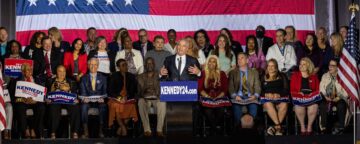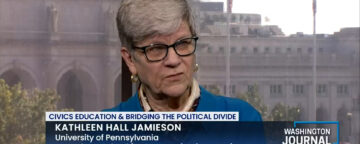In PNAS, APPC researchers identify factors that reflect public assessments of science and are associated with public support for increasing U.S. funding of science.


In PNAS, APPC researchers identify factors that reflect public assessments of science and are associated with public support for increasing U.S. funding of science.

Annenberg Classroom has released a new educational film on the landmark First Amendment freedom of the press case New York Times v. Sullivan.

Many Americans don't know the rights protected in the First Amendment or basic facts such as the branches of government, the 2023 Annenberg Constitution Day Civics Survey finds.

In a new three-part series, FactCheck.org examines Democratic presidential candidate Robert F. Kennedy, Jr.'s false and misleading claims about vaccines, autism, Covid-19 and other health topics.

Annenberg Public Policy Center Director Kathleen Hall Jamieson discussed civics education and bridging political divides on C-SPAN's "Washington Journal."

People are more apt to recommend vaccination against RSV to a pregnant family member or friend, to protect the infant, if shown a chart of the FDA's rigorous approval process.

A Penn team led by Professor Dolores Albarracín received a National Institutes of Health grant to identify ways to increase vaccination rates, focusing on a future HIV vaccine.

There are substantial gaps in knowledge about maternal health, according to new survey data. In addition, few people know that 988 is the new Suicide and Crisis Lifeline.

Chris Ingalls and KING 5 News in Seattle received the Brooks Jackson Prize for Fact-Checking for a series of TV reports on efforts to undermine trust in elections.

New survey-based research finds that adults who embraced a conspiratorial mindset in 2021 were more resistant to vaccinating a child against Covid-19 the following year.